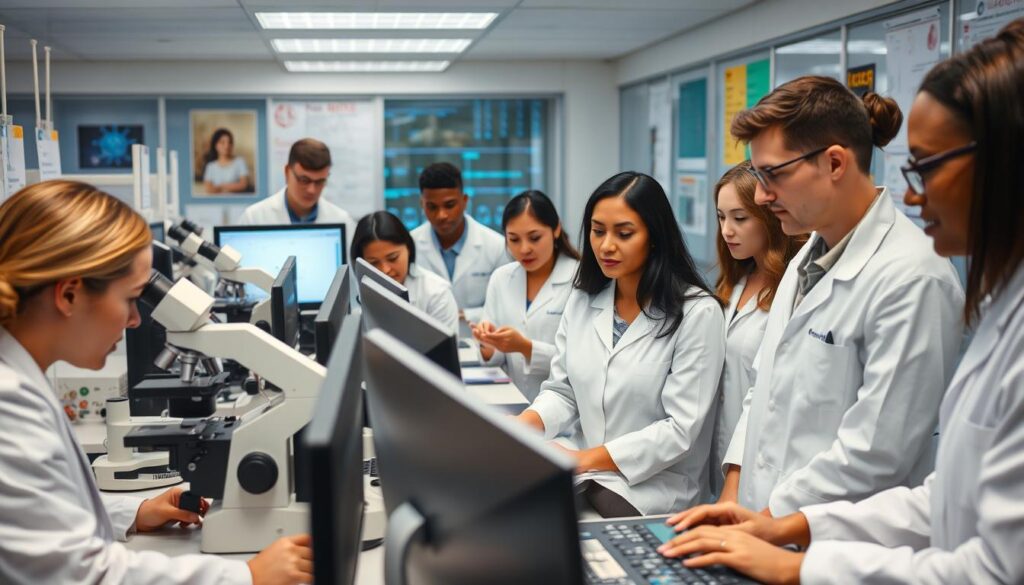Master’s Degree in Biomedical Science Preparing Professionals for Scientific Careers

A master’s degree in biomedical science provides an advanced educational pathway for individuals aspiring to pursue professional careers in scientific research, healthcare, and related industries. The program combines rigorous coursework with practical laboratory training to equip students with the knowledge, technical skills, and analytical abilities required to excel in various scientific fields. Students gain expertise in areas such as molecular biology, microbiology, immunology, pharmacology, and biochemistry, preparing them to conduct meaningful research and contribute to scientific advancements.
Biomedical science serves as a critical foundation for understanding human health and disease. By studying the mechanisms of cellular processes, disease progression, and therapeutic interventions, graduates develop the capability to translate laboratory discoveries into clinical or industrial applications. This dual focus on theory and practice ensures that students are well-prepared to tackle complex scientific problems and pursue advanced professional opportunities.
Comprehensive Curriculum and Learning Objectives
The curriculum in a Master’s program emphasizes both conceptual understanding and hands-on skills. Core courses typically cover molecular biology, genetics, cellular biology, immunology, and biochemistry, with specialized modules on emerging biomedical technologies. Laboratory-based courses complement theoretical instruction, providing students with opportunities to develop practical competencies in experimental design, data collection, and analytical techniques.
Students are also trained in research methodology, statistical analysis, and scientific writing. These skills are essential for producing high-quality research, interpreting complex data, and presenting findings to both scientific and professional audiences. Additionally, many programs incorporate bioinformatics, allowing students to manage and analyze large datasets, including genomic and proteomic information, which are increasingly essential in modern biomedical research.
Hands-On Laboratory Experience
A defining feature of a Master’s in Biomedical Science is the emphasis on laboratory experience. Students gain extensive practical training in techniques such as polymerase chain reaction (PCR), western blotting, cell culture, flow cytometry, immunohistochemistry, and microscopy. This hands-on experience helps students develop technical expertise and confidence in applying theoretical knowledge to real-world research scenarios.
Laboratory work is often structured around research projects that simulate professional scientific investigations. Students may examine molecular pathways associated with disease, evaluate the effectiveness of novel treatments, or develop diagnostic assays. These experiences allow students to refine their experimental techniques, troubleshoot challenges, and learn how to manage laboratory resources efficiently. Access to advanced equipment, such as sequencing platforms and high-resolution imaging systems, prepares students for careers in research-intensive environments.
Research Opportunities and Thesis Development
A central component of the Master’s program is the research thesis or capstone project. Under the supervision of faculty mentors, students design and execute a comprehensive research study, analyze results, and present their findings in written and oral formats. Thesis projects often focus on critical areas of biomedical science, such as cancer biology, neurodegenerative diseases, infectious diseases, or therapeutic development.
Completing a research project hones critical thinking, problem-solving, and independent scientific inquiry. Students learn to formulate hypotheses, design experiments, interpret data, and draw conclusions. These skills are highly valued in research laboratories, healthcare institutions, and biotechnology companies, making graduates competitive candidates for advanced positions and professional opportunities.
Interdisciplinary Collaboration
Biomedical research often involves collaboration across multiple disciplines, including biology, chemistry, physics, and computational sciences. Master’s students are encouraged to engage in interdisciplinary projects, gaining exposure to various methodologies and approaches. Collaboration fosters teamwork, communication, and the ability to approach complex problems from multiple perspectives.
Participation in seminars, workshops, and research presentations allows students to share findings with peers, faculty, and industry professionals. These interactions not only improve communication skills but also provide networking opportunities that can lead to future research collaborations or employment prospects. Professional connections established during a Master’s program can be instrumental in shaping a student’s career trajectory.
Advanced Technologies and Analytical Skills
Modern biomedical science relies heavily on advanced technologies. Students gain hands-on experience with instruments and techniques such as confocal microscopy, flow cytometry, next-generation sequencing, and proteomic analysis. Training in these technologies enables students to investigate cellular and molecular mechanisms with precision and efficiency.
Analytical skills are also developed through exposure to bioinformatics, computational modeling, and statistical data analysis. The ability to interpret complex datasets, identify meaningful patterns, and apply these insights to research questions is critical for success in scientific careers. Graduates emerge with a combination of technical proficiency and analytical capability that is highly sought after in research, clinical, and industry settings.
Professional Development and Career Preparation
A Master’s program in Biomedical Science is designed to support professional growth. Students develop skills in project management, scientific communication, teamwork, and problem-solving. These competencies are essential for managing research projects, leading laboratory teams, and contributing effectively in professional environments.
Internships or industry placements are often incorporated into the curriculum, offering practical experience in biotechnology, pharmaceuticals, or clinical research laboratories. Such placements allow students to understand workplace dynamics, regulatory requirements, and laboratory operations. This experience enhances employability and prepares graduates for leadership and managerial roles within their chosen fields.
Career Opportunities in Scientific Fields
Graduates with a Master’s in Biomedical Science have a wide range of career options. Many pursue doctoral studies or medical school, leveraging their advanced research training to specialize further in a particular area of biomedical science. Others enter the workforce directly in biotechnology, pharmaceutical development, clinical research, or diagnostic laboratories.
Professional roles may include research scientist, laboratory manager, clinical laboratory technologist, regulatory affairs specialist, or scientific consultant. In these positions, graduates contribute to drug development, therapeutic research, disease modeling, and diagnostic innovations. The combination of laboratory expertise, analytical skills, and research experience makes them competitive candidates for both scientific and leadership positions.
Contributions to Scientific Innovation
Master’s graduates play an integral role in advancing biomedical research. Hands-on laboratory experience, combined with theoretical knowledge, enables them to design experiments, develop new methodologies, and contribute to scientific discoveries. Their work supports the development of diagnostic tools, therapeutic interventions, and innovative medical technologies.
By understanding disease mechanisms and evaluating potential treatments, graduates can directly influence the quality and effectiveness of healthcare solutions. The skills acquired during a Master’s program position students to participate in cutting-edge research projects that have meaningful impacts on human health.
Ethics and Research Integrity
Ethical training is a fundamental component of a Master’s in Biomedical Science. Students learn to conduct research responsibly, maintain data integrity, and adhere to regulatory standards. Ethical considerations include proper handling of biological samples, accurate reporting of results, and compliance with legal and professional guidelines.
Understanding and applying ethical principles ensures that research is conducted safely, reliably, and with scientific rigor. Graduates who demonstrate strong ethical practices are more likely to gain credibility and succeed in professional and academic settings, where integrity is essential for meaningful contributions to science.
Networking and Professional Engagement
Students are encouraged to engage in professional development opportunities, including scientific conferences, seminars, and workshops. Presenting research findings and participating in discussions with peers and experts helps students refine communication skills, stay current with emerging research trends, and build professional networks.
These interactions often lead to collaborations, mentorship opportunities, and access to future employment prospects. Networking is a critical aspect of career development, allowing graduates to learn from established professionals, discover new research avenues, and connect with potential employers.
Integration of Technology and Data Management
Proficiency in technology and data management is increasingly important in biomedical science. Students are trained in using laboratory information systems, data analysis software, and computational tools to manage and interpret complex datasets. Skills in bioinformatics, statistics, and modeling enhance their ability to contribute meaningfully to research projects and interpret results accurately.
The ability to integrate technological tools with laboratory expertise ensures that graduates are prepared for modern scientific environments, where precision, efficiency, and data-driven decisions are essential for success.
Conclusion
A Master’s Degree in Biomedical Science prepares students for a wide range of scientific careers by combining theoretical knowledge, hands-on laboratory experience, and professional skill development. The program equips graduates with expertise in molecular biology, microbiology, immunology, and bioinformatics, enabling them to conduct meaningful research and contribute to scientific advancement.
Through laboratory training, research projects, and thesis work, students develop technical proficiency, analytical thinking, and problem-solving skills. Interdisciplinary collaboration, professional development opportunities, and exposure to advanced technologies further enhance career readiness.
Graduates are prepared to pursue doctoral studies, clinical research, biotechnology, pharmaceutical development, or laboratory management roles. Their contributions support innovation in diagnostics, therapeutics, and medical research, advancing health sciences and improving patient outcomes. Institutions such as UNT Health Fort Worth provide state-of-the-art facilities and expert mentorship, offering students practical experience that strengthens their professional readiness.
By integrating laboratory skills, analytical expertise, and professional competencies, a Master’s in Biomedical Science ensures that graduates are well-equipped to excel in scientific careers. The program fosters the development of skilled, knowledgeable, and adaptable professionals capable of making meaningful contributions to research, healthcare, and the broader scientific community.
